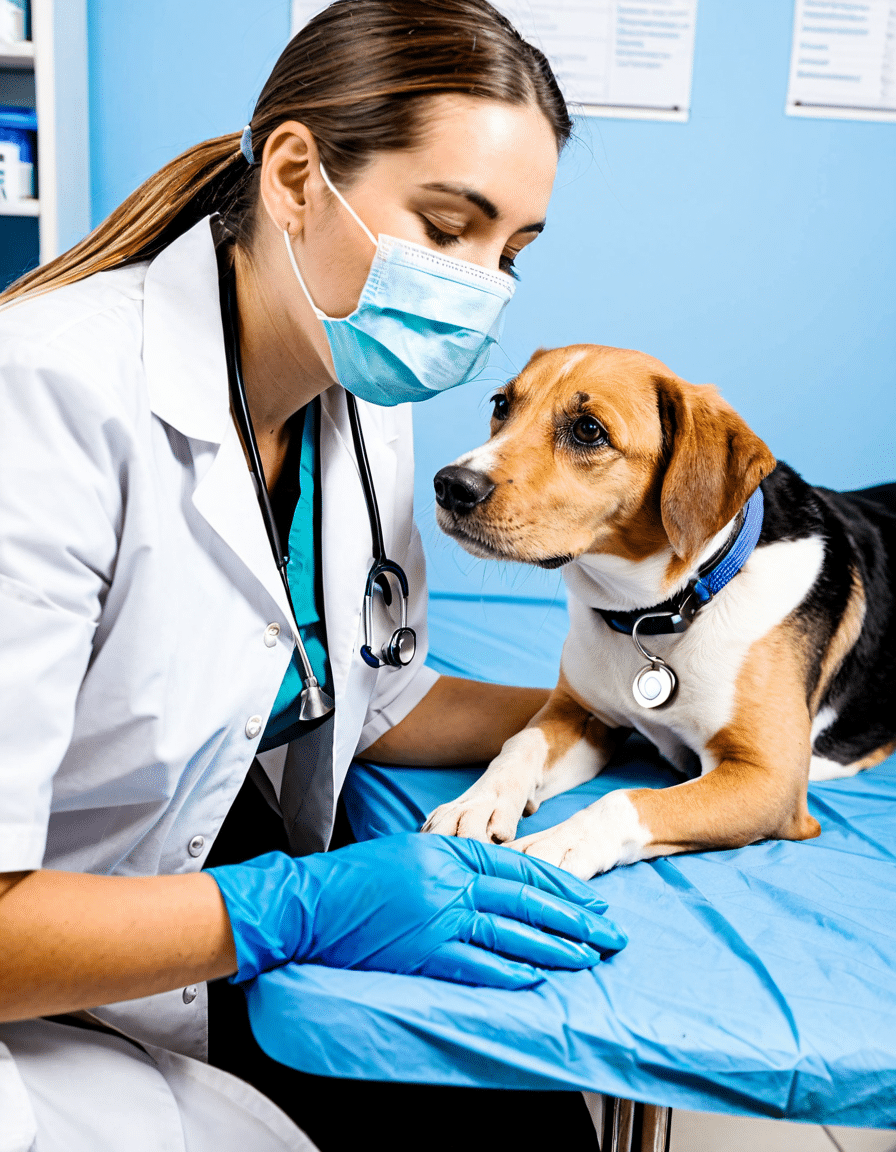When it comes to keeping our furry friends healthy, we always want what’s best for them. Sucralfate dogs may have caught your attention in discussions about gastrointestinal care, and it’s no wonder! This medication, primarily used in veterinary medicine, can be a game changer for pets suffering from various digestive issues. It works by creating a protective barrier over ulcers in the gastrointestinal tract, making it a common choice for vets treating certain conditions. But are sucralfate and its use in treating dogs truly safe and effective? Let’s dive in!
What is Sucralfate for Dogs?
Sucralfate is a medication that acts as a mucosal protectant. When your dog is facing gastrointestinal challenges, sucralfate can coat ulcers or areas of irritation in the GI tract, promoting healing and easing discomfort. It’s particularly important for pet parents to understand how this treatment works so that they can support their furry companions effectively.
Veterinarians often prescribe sucralfate for conditions where the stomach lining or esophagus needs extra protection. Whether involving gastric ulcers or inflammation caused by acid reflux, knowing that sucralfate can play a vital role in your dog’s recovery is comforting. This understanding empowers owners to be proactive when addressing their pet’s health concerns.

Conditions Treated with Sucralfate in Dogs
1. Gastric Ulcers
Gastric ulcers in dogs can arise for a multitude of reasons, from stress to certain non-steroidal anti-inflammatory drugs (NSAIDs). When your pet develops these painful ulcers, sucralfate can get to work. It coats the ulcer, promoting healing and relieving discomfort, which is essential for getting your pup back to their energetic self.
2. Esophagitis
Sometimes, dogs may experience inflammation of the esophagus, known as esophagitis. This condition commonly results from acid reflux or ingesting irritating substances. Sucralfate helps soothe the esophageal lining, reducing pain and preventing further damage while allowing your pet to enjoy their meals again.
3. Gastroesophageal Reflux Disease (GERD)
For dogs with GERD, sucralfate acts like a comforting shield, offering protection to the esophagus while assisting in the healing process. Keeping your dog’s digestive system healthy is crucial, especially if they’re prone to vomiting or burping.
4. Diarrhea Management
In specific situations, particularly when using the canine endosorb formulation, sucralfate can help manage diarrhea. It provides a soothing layer that can mitigate inflammation in the gut, giving your pup a break from discomfort while addressing loose stools.
5. Radiation Therapy Side Effects
If your dog is receiving radiation therapy for cancer, sucralfate might ease the gastrointestinal side effects associated with treatment. By protecting sensitive tissues, it helps facilitate a smoother recovery process during challenging times.
How to Administer Sucralfate Safely to Your Dog
1. Dosage and Timing
Getting the dosage right is key. Pet owners should always follow their veterinarian’s guidance, as the dosage can vary based on the dog’s size and specific health needs. Sucralfate is usually prescribed to be administered 2-4 times a day on an empty stomach. This ensures the most effective absorption and promotes smoother healing.
2. Monitor for Side Effects
As with any medication, it’s essential to keep an eye out for side effects. While most dogs tolerate sucralfate well, some might experience constipation or mild gastrointestinal discomfort. If you notice any significant changes, be sure to check in with your veterinarian for advice.
3. Interaction with Other Medications
Sucralfate has a tendency to bind with other medications, which can reduce their effectiveness. If your dog is on multiple medications, spacing out the administration of sucralfate is crucial. This is especially vital for drugs treating gastrointestinal issues or pain, ensuring all treatments work as intended.

Sucralfate Canine: Alternatives and Comparisons
1. Famotidine (Pepcid)
One common companion to sucralfate is famotidine, a medication that reduces stomach acid production. Vets often prescribe these two together, as they create a powerful combination for treating gastric ulcers and related issues.
2. Omeprazole (Prilosec)
Similar to famotidine, omeprazole is a proton pump inhibitor that aids in long-term management of gastric acid secretion. It’s often recommended for dogs with chronic conditions, ensuring they find relief over time.
3. Canine Endosorb
For those times when routine sucralfate doesn’t completely resolve diarrhea, canine endosorb can be an option to consider. This special formulation is specifically made for dogs, addressing concerns such as diarrhea more effectively.
Real-Life Success Stories and Expert Opinions
1. Case Study: Bella’s Role in Recovery
Take Bella, a spirited six-year-old Labrador. She battled severe gastric ulcers that sidelined her energy and appetite. After beginning her sucralfate treatment for 30 days, she saw a monumental change. Her owners reported increased energy levels and a hearty appetite, syncing perfectly with what her vet expected for her recovery.
2. Veterinary Insights
Dr. Sarah Thompson, a veterinary gastroenterologist, emphasizes using sucralfate as part of a holistic approach. “It’s crucial to not rely solely on medication,” she says. “Incorporating dietary modifications and continuous monitoring helps address underlying health issues, empowering both the pet and the owner.”
Innovative Alternatives and Research Directions
As veterinary practices advance, ongoing research into ulcer management reveals exciting developments:
Final Thoughts on Sucralfate for Dogs
Assessing the safety and effectiveness of sucralfate for dogs reveals many positive aspects. It’s a valuable treatment for various gastrointestinal conditions, though not without potential side effects. By staying informed and consulting your veterinarian, you can create a well-rounded approach that supports your furry friend’s health.
Remember, when navigating concerns like gastric ulcers or GERD, your engagement in your pup’s care is critical. Strategies including proper medication administration, dietary adjustments, and holistic approaches can work together. Don’t hesitate to explore resources for further insights, like advice on dog limping on back leg or understanding if golden Retrievers are aggressive. With dedication and the right tools, you’ll be on a path to maximizing your dog’s happiness and health!
Sucralfate Dogs: Are They Safe and Effective for Your Pet?
Interesting Tidbits About Sucralfate
Did you know sucralfate isn’t a household name, but it’s got some fascinating history? Initially developed in the late 1960s to treat ulcers in humans, this medication has paved the way for use in dogs, helping with gastrointestinal issues like stomach ulcers. This is particularly relevant for dog owners dealing with health conditions. For instance, if your furry friend suffers from Cushing’s disease, you might be pondering the ethical question: when is it time to consider euthanasia? It’s a tough call, but supportive treatments can sometimes improve quality of life.
In addition to its medicinal qualities, sucralfate works in a rather nifty way. It creates a protective barrier over ulcers, much like that colorful children’s rhyme about Miss Mary mack—you might say it’s a little protective suit for your pup’s insides! Just like how doggie Diapers For male Dogs can prevent accidents while they recover, sucralfate ensures your dog’s stomach can heal relatively undisturbed.
Sucralfate’s Role in Pet Care
Here’s something else to consider: sucralfate isn’t a stand-alone solution. While it can be effective, it often forms part of a broader treatment strategy, including dietary changes or other medications. Feeding them a balanced diet is crucial, and for pet owners who love gardening, using products like a 5-10-10 fertilizer can help cultivate a healthy environment that’s beneficial for all sorts of pups, whether they need extra nutrients or just a nice spot to roll around in.
As you weigh out sucralfate options, keep in mind that keeping your dog comfortable goes beyond medication. There are fun, unique ways to support your pet’s recovery. For instance, many people experiment with calming aromas, like a rose vibe diffuser, creating a soothing atmosphere for their pets. Just like Everything but The house sales, caring for your pet should involve a mix of essential and delightful elements!
In conclusion, while sucralfate for dogs can be a safe and effective treatment method, it’s essential to blend it with other supportive measures. So, whether you’re actively addressing health concerns or simply enjoying cuddles on the couch, keeping informed about medications and treatments can lead to a happier, healthier pup.



